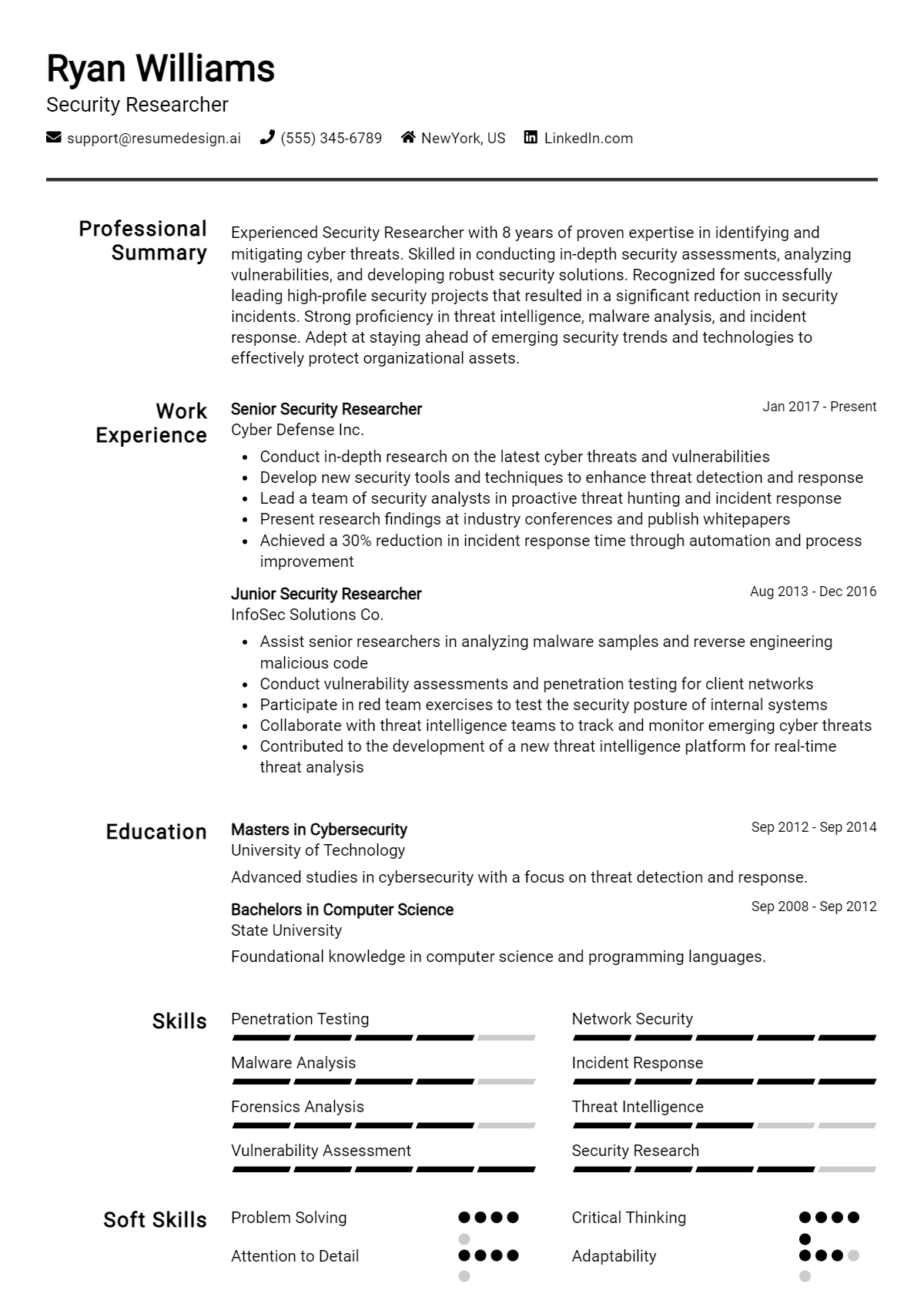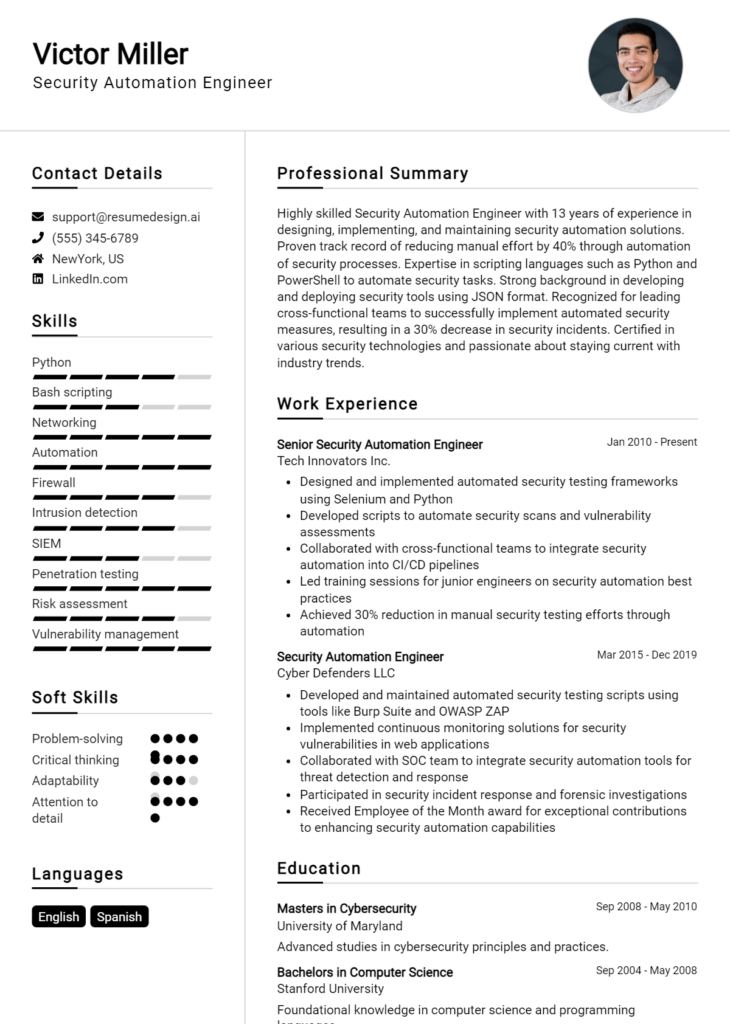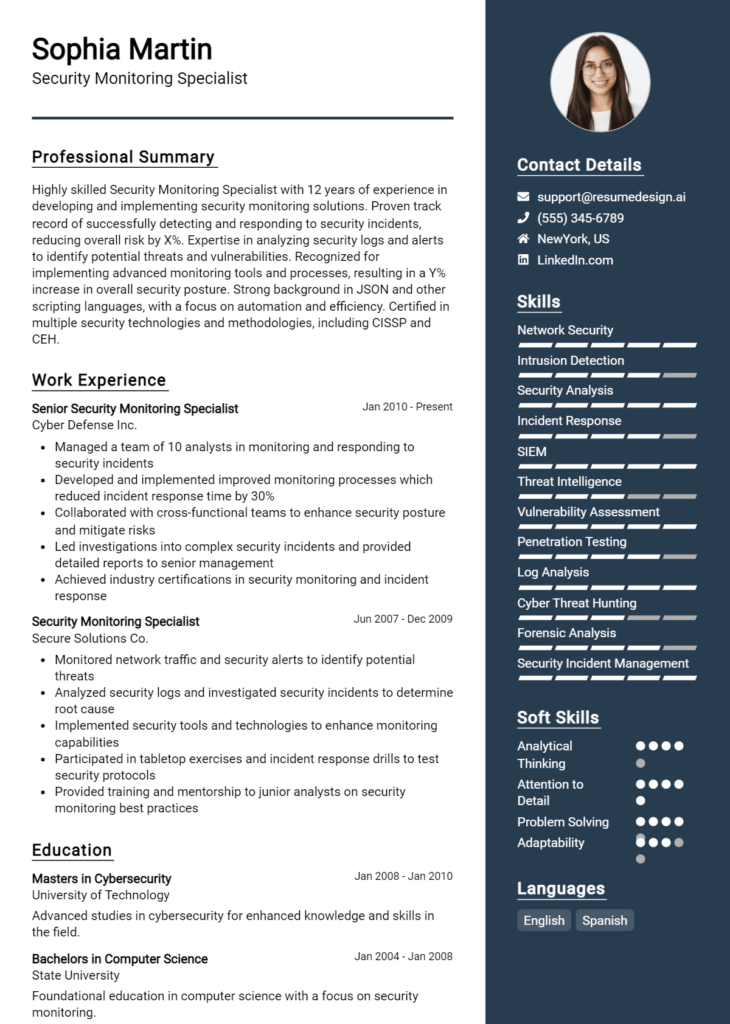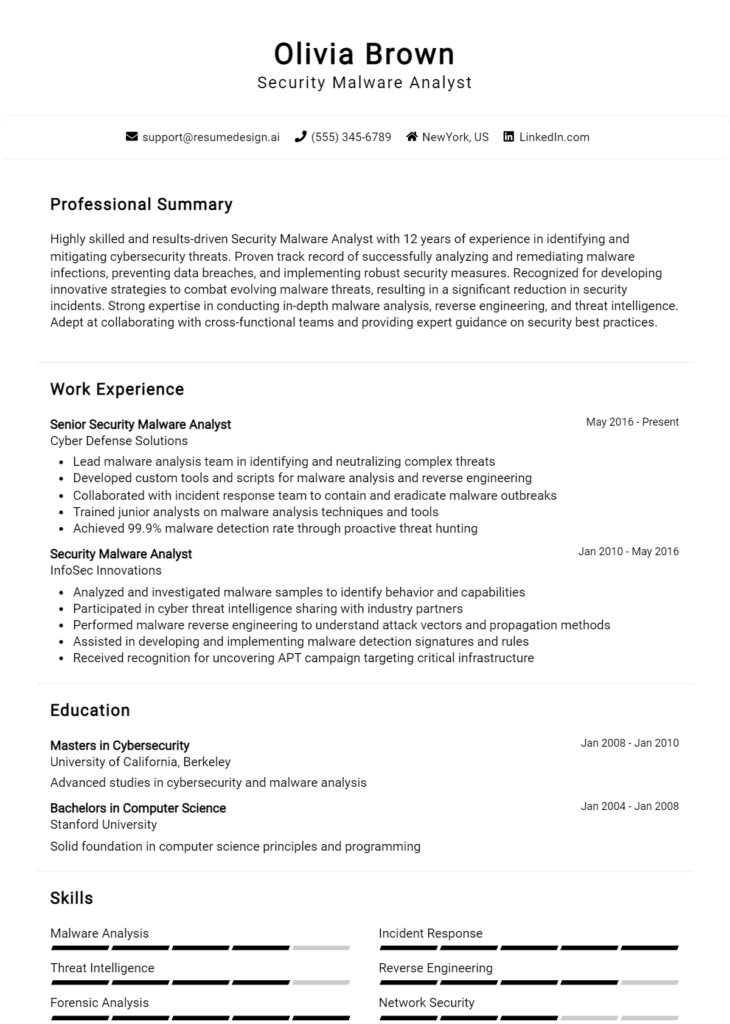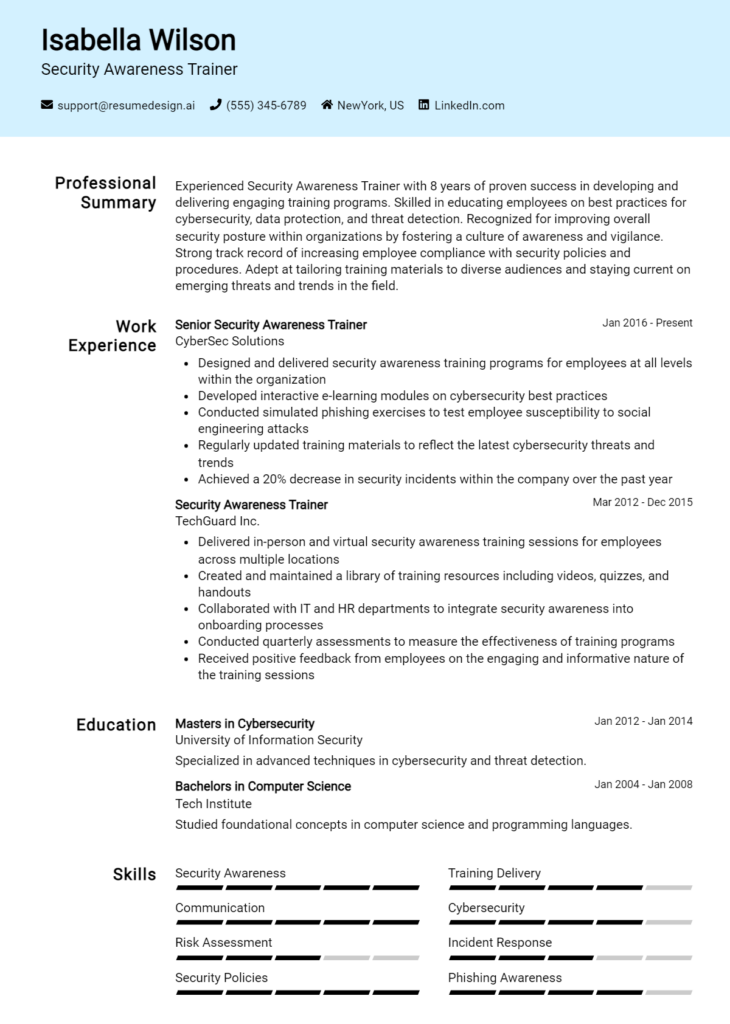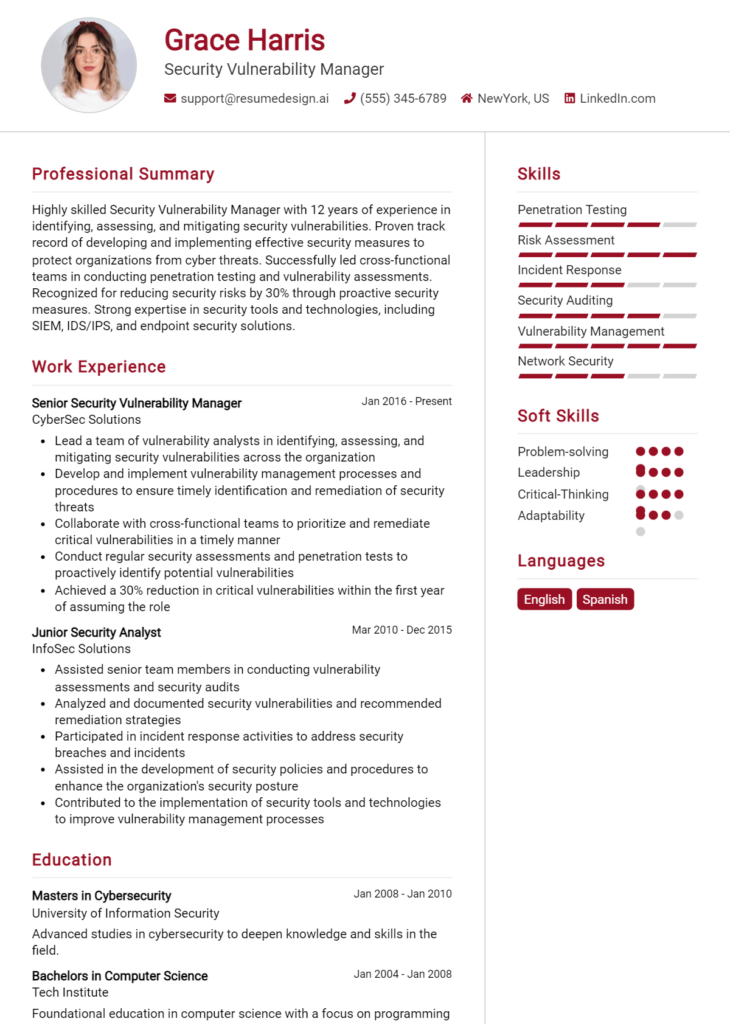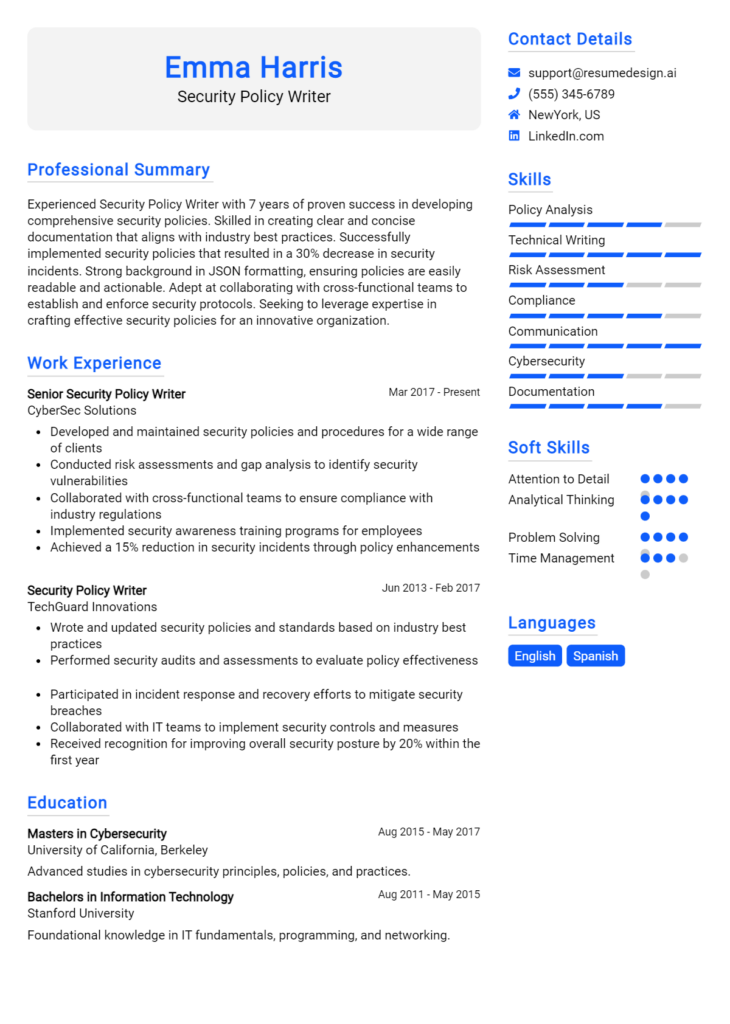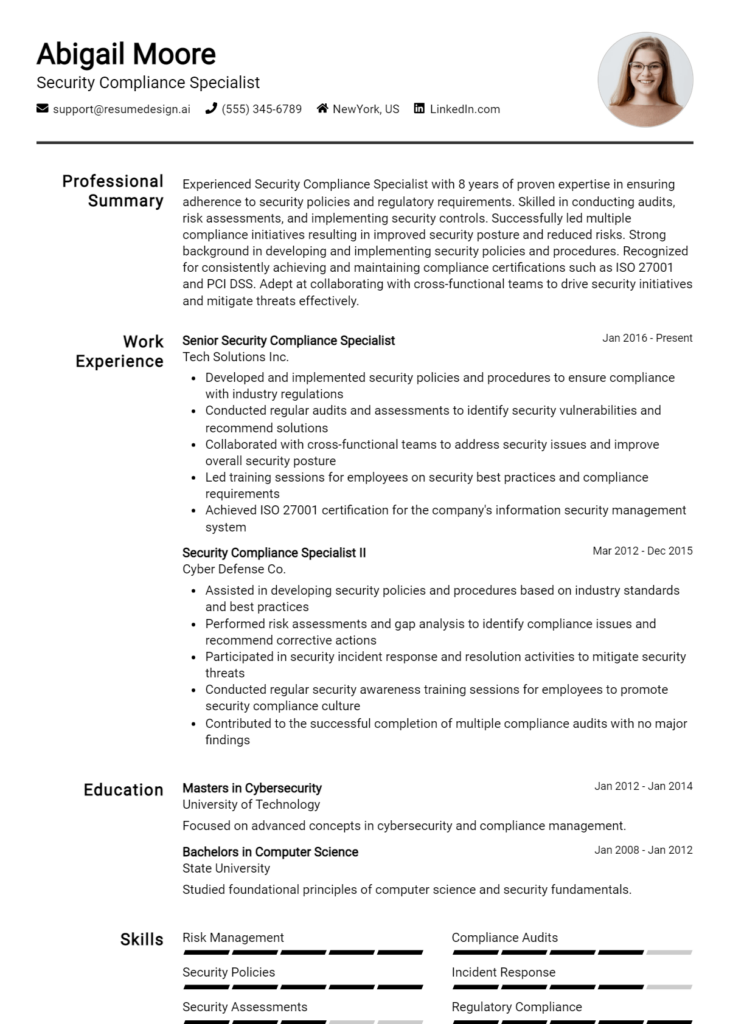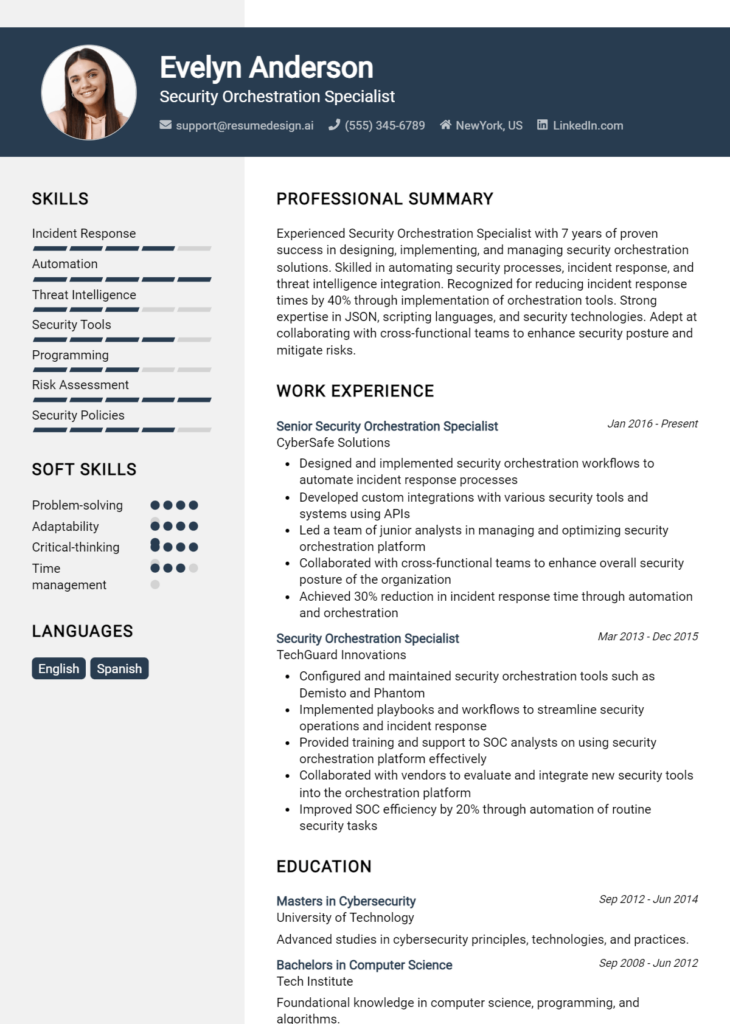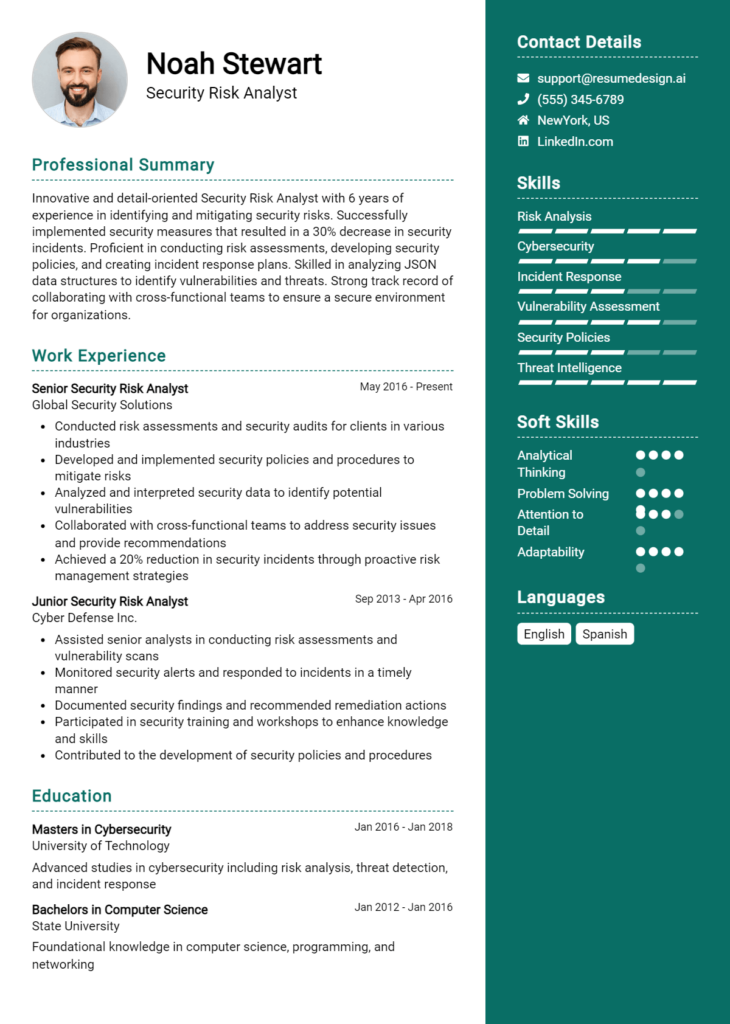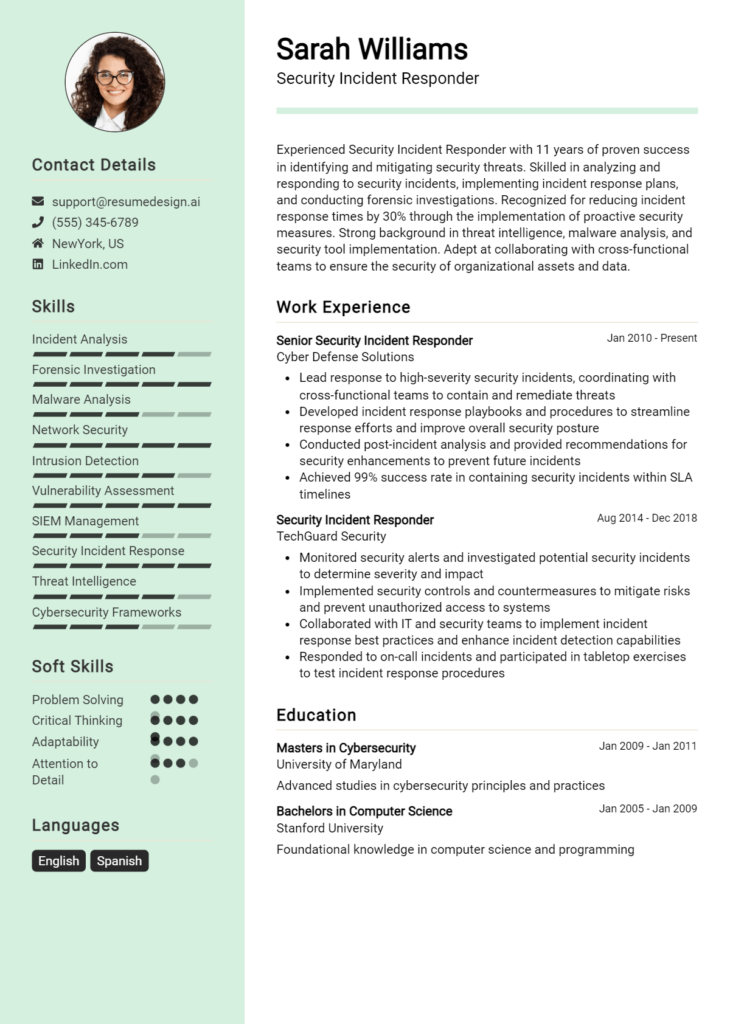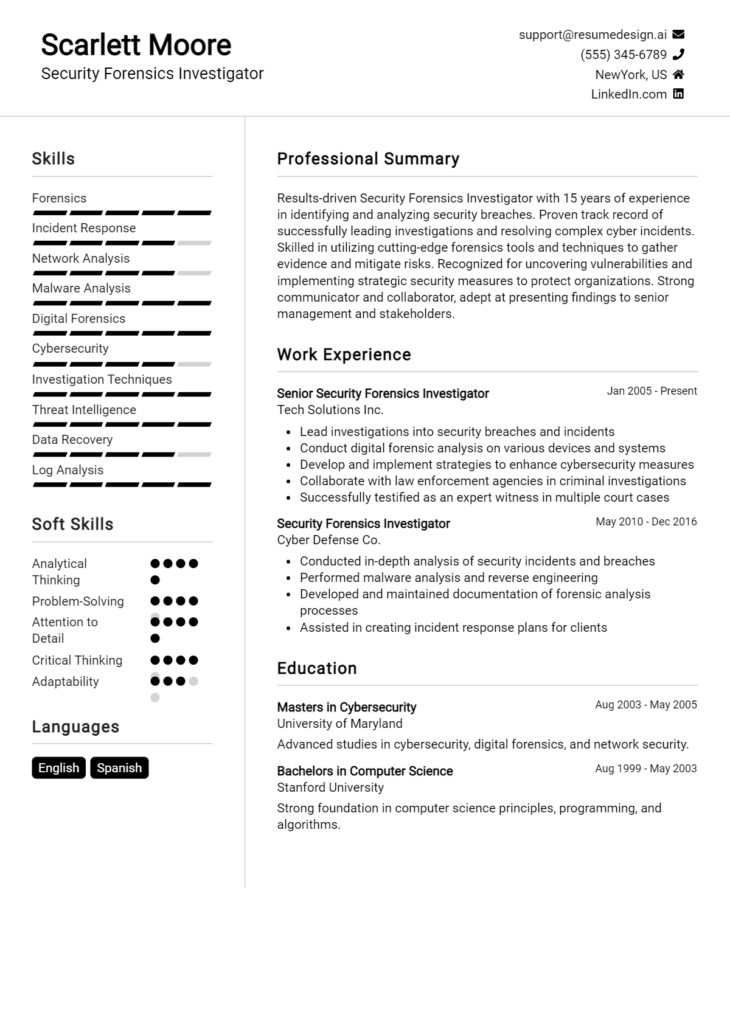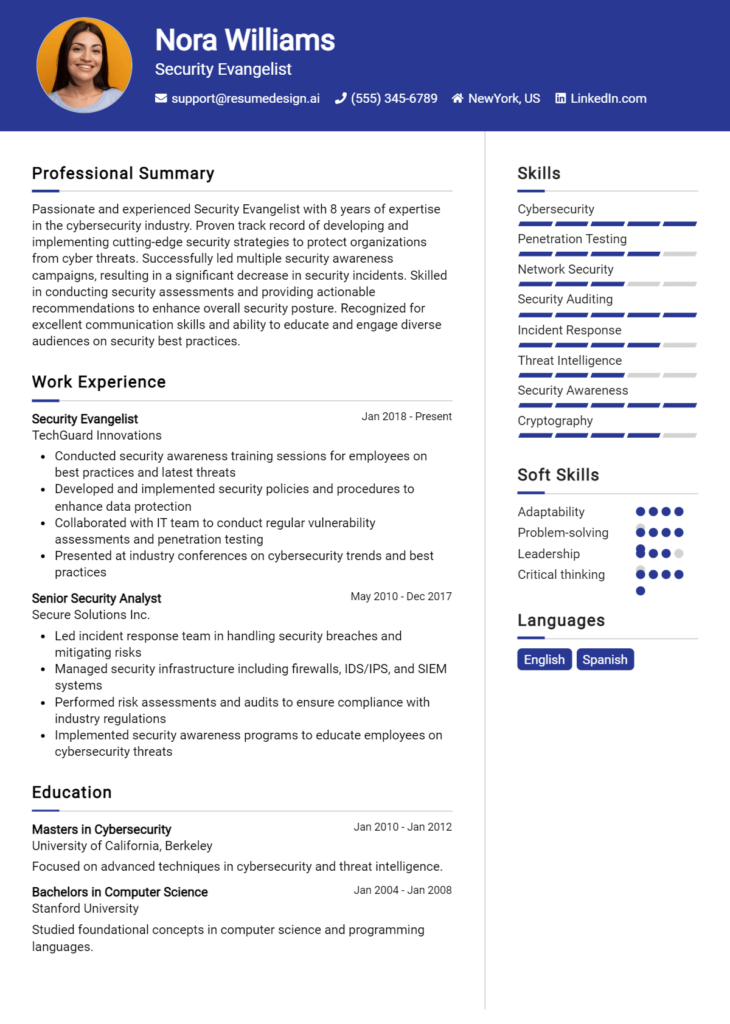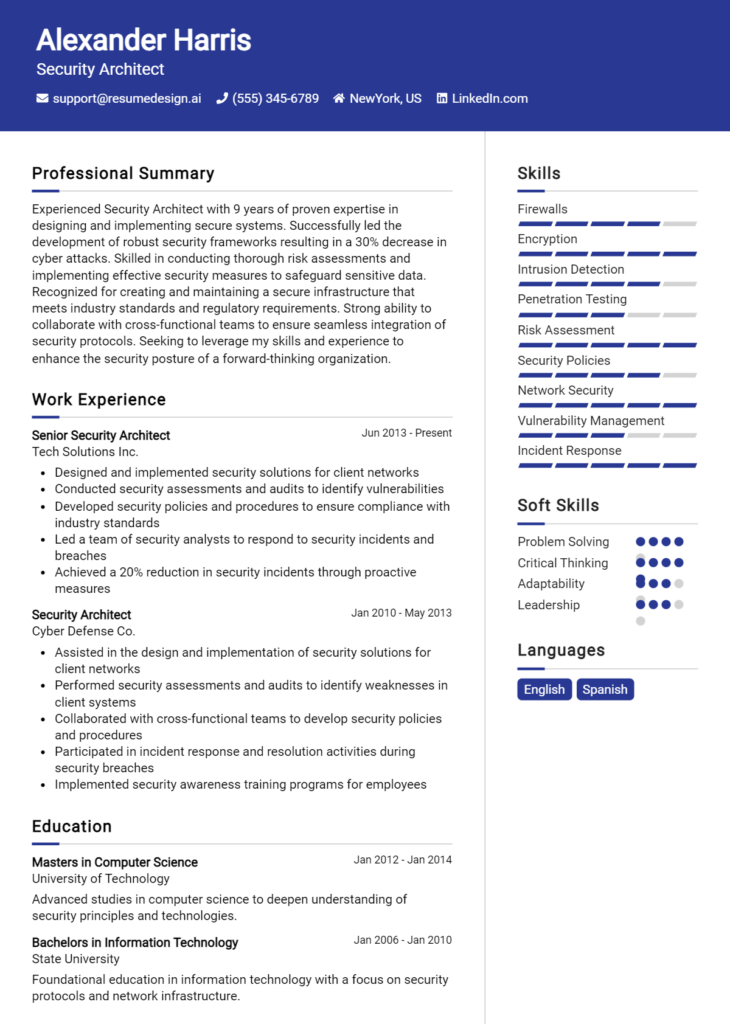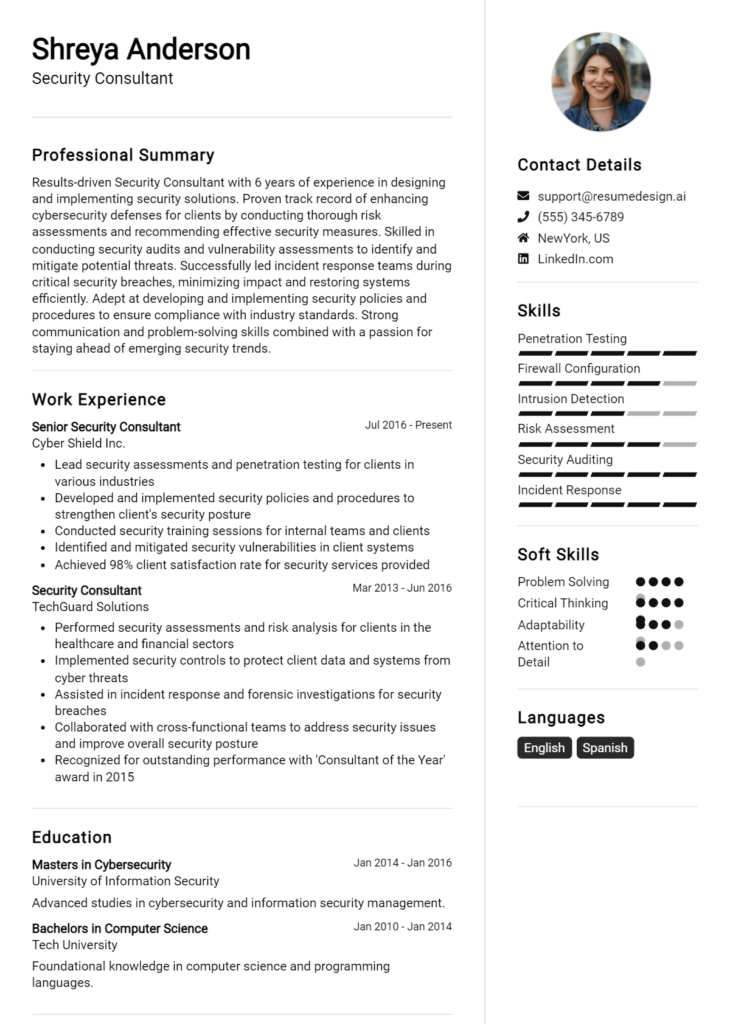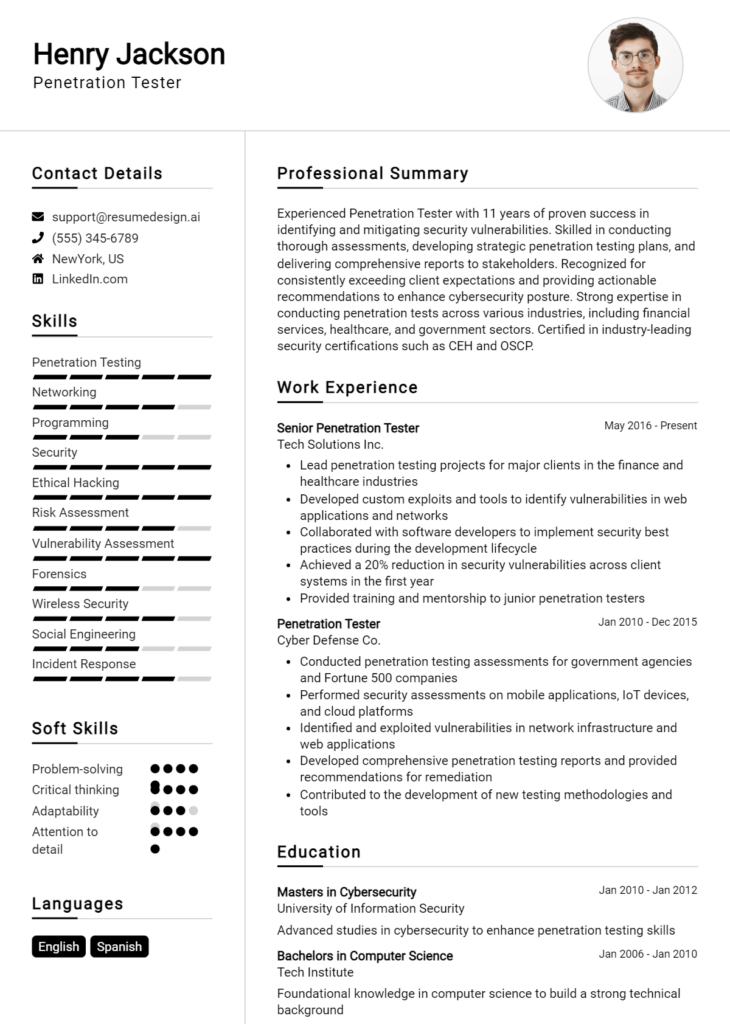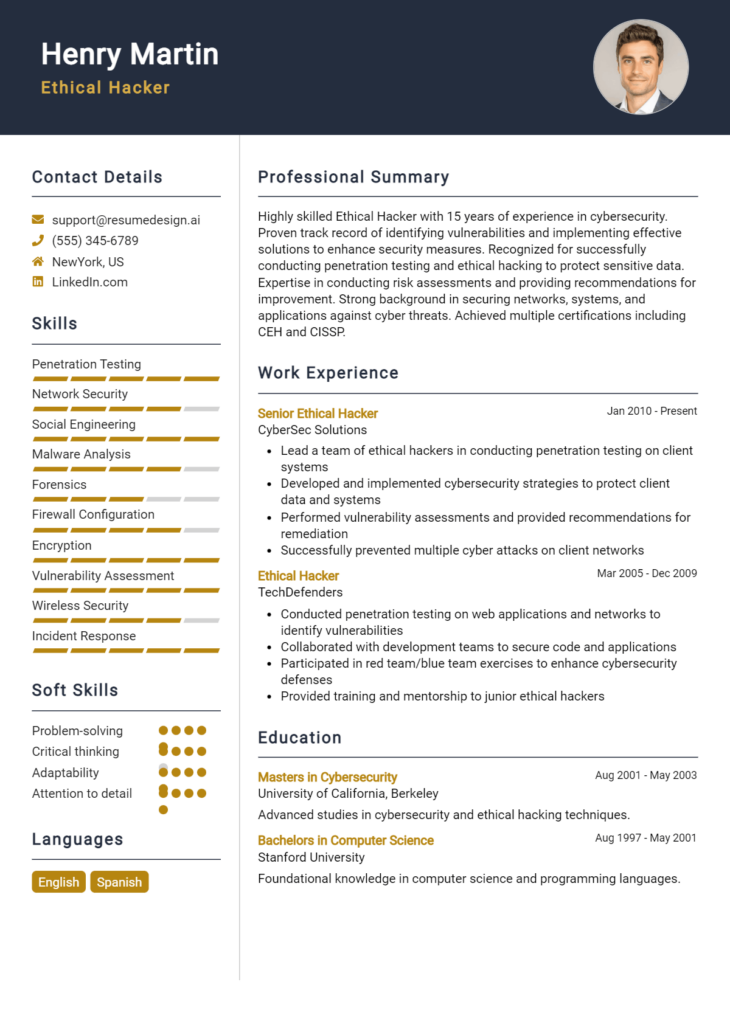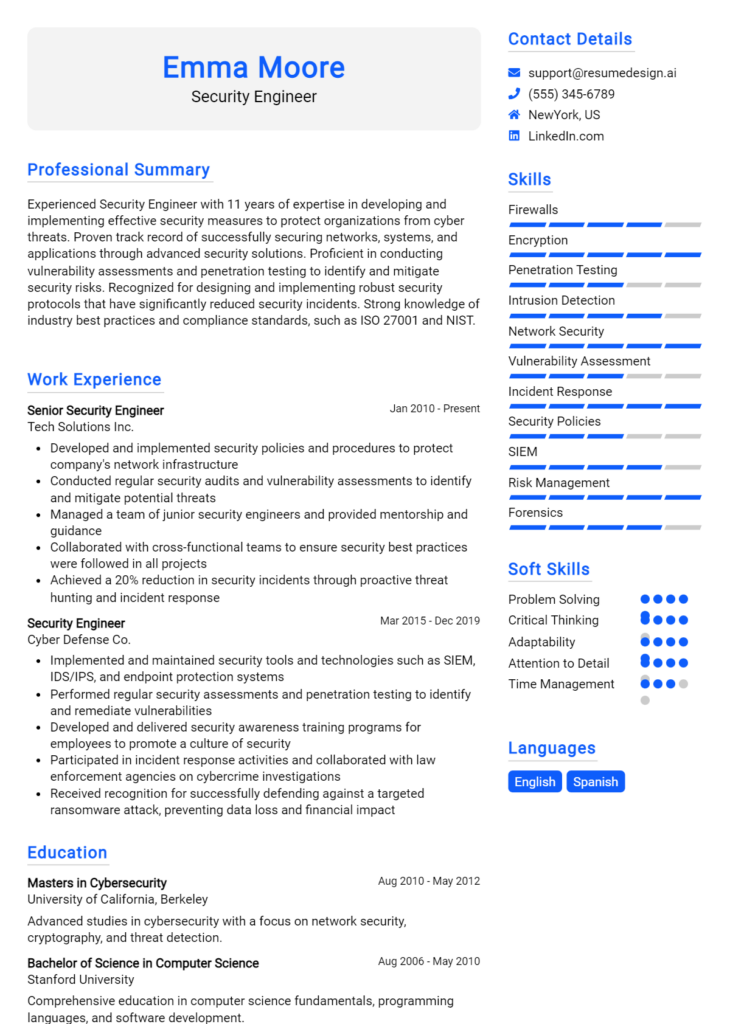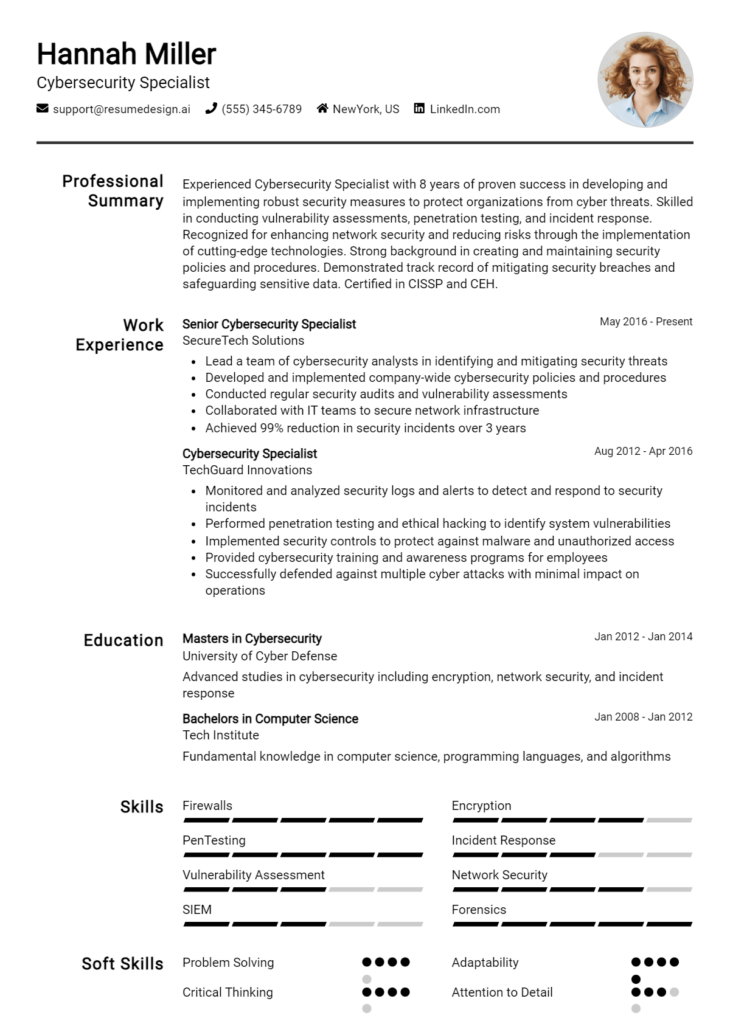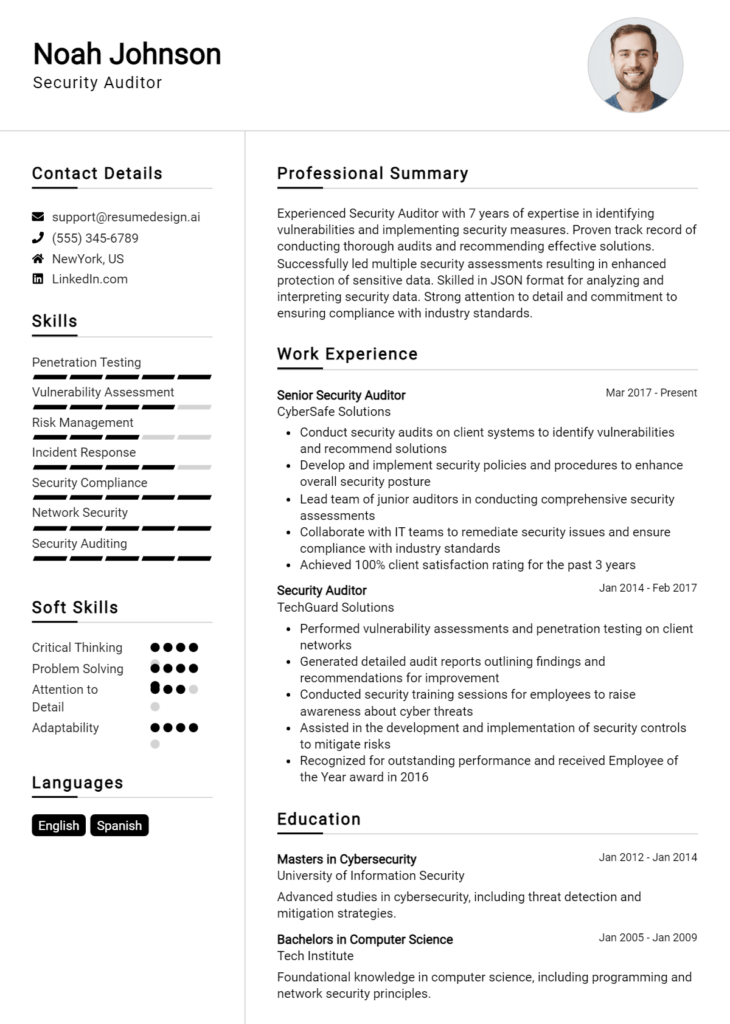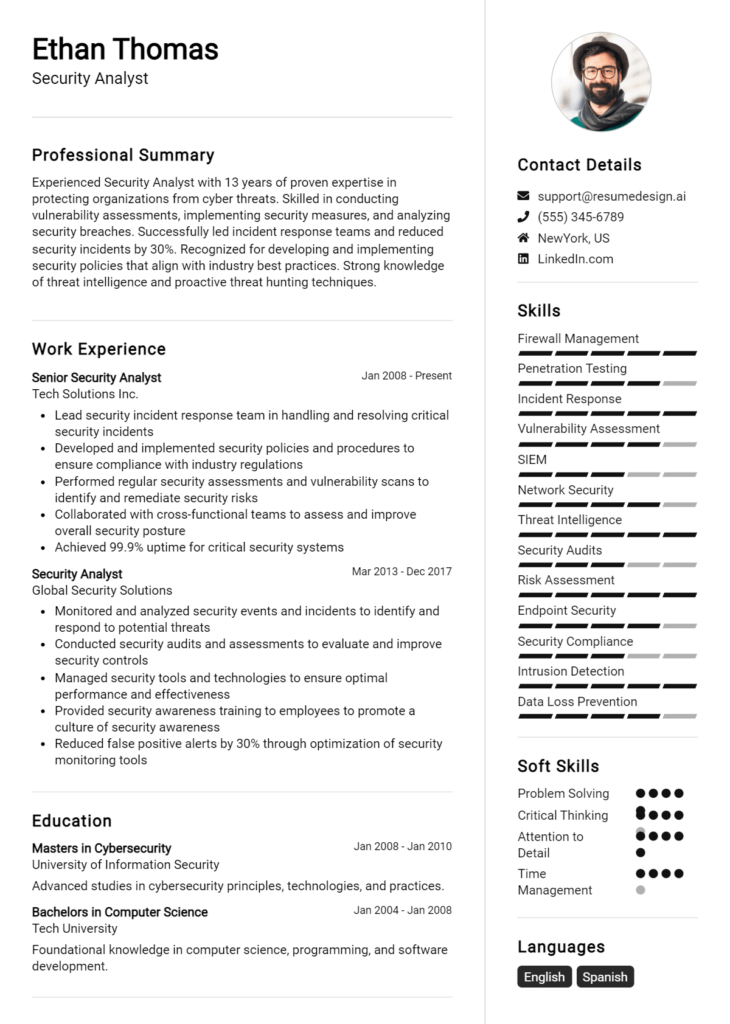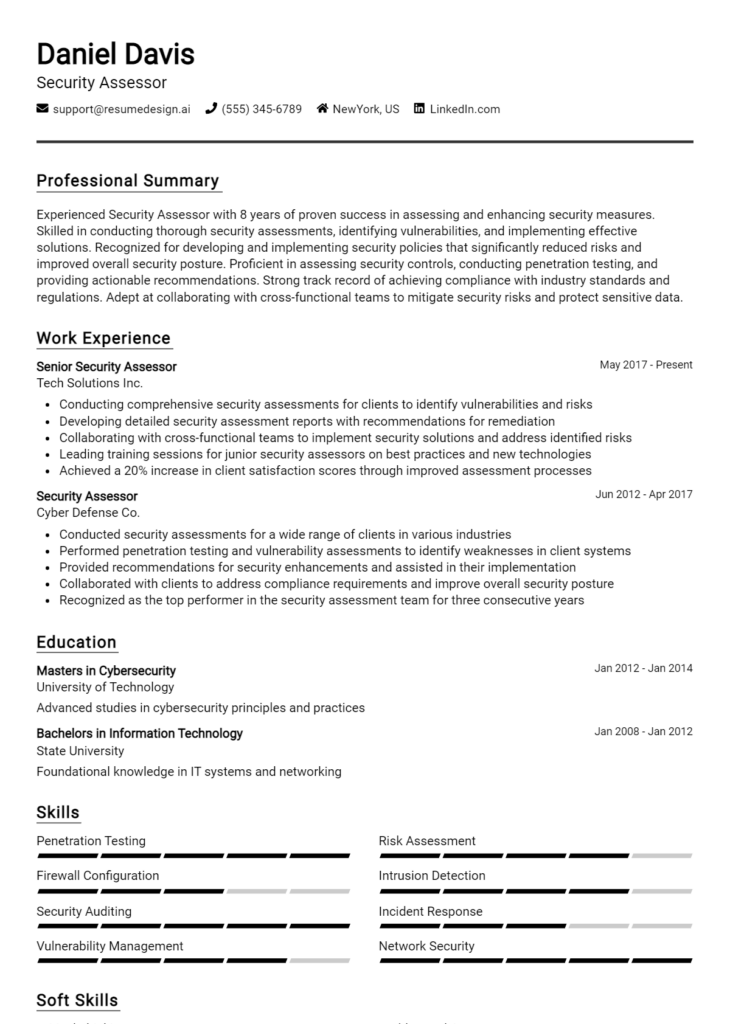Security Researcher Core Responsibilities
A Security Researcher plays a pivotal role in safeguarding an organization’s digital assets by conducting thorough analyses of security systems and identifying vulnerabilities. This position requires a blend of technical expertise—such as proficiency in programming and cybersecurity frameworks—and strong operational and problem-solving skills. By collaborating with departments like IT, compliance, and risk management, Security Researchers ensure that security measures align with organizational goals. A well-structured resume effectively showcases these qualifications, highlighting the candidate’s ability to bridge gaps across functions and contribute to a robust security posture.
Common Responsibilities Listed on Security Researcher Resume
- Conducting vulnerability assessments and penetration testing.
- Analyzing malware and threat intelligence data.
- Developing security protocols and guidelines.
- Collaborating with cross-functional teams to enhance security measures.
- Researching emerging threats and security technologies.
- Performing risk assessments and audits.
- Creating detailed reports on security incidents and findings.
- Participating in incident response and recovery efforts.
- Educating staff on security best practices.
- Maintaining up-to-date knowledge of industry trends and regulations.
- Developing and implementing security training programs.
- Utilizing security tools and software for monitoring and analysis.
High-Level Resume Tips for Security Researcher Professionals
In the competitive field of cybersecurity, a well-crafted resume is essential for Security Researcher professionals seeking to make a strong first impression on potential employers. Your resume often serves as the initial touchpoint in the hiring process, where you have the opportunity to showcase your skills, achievements, and unique qualifications. It should not only highlight your technical competency but also reflect your ability to solve complex security challenges and contribute to the organization's overall mission. This guide will provide practical and actionable resume tips specifically tailored for Security Researcher professionals to help you stand out in a crowded job market.
Top Resume Tips for Security Researcher Professionals
- Tailor your resume for each job application by incorporating keywords and phrases from the job description.
- Highlight relevant experience in security research, including internships, projects, and previous employment.
- Quantify your achievements by using metrics to demonstrate the impact of your work, such as reduced vulnerabilities or improved security protocols.
- Showcase your technical skills, including programming languages, tools, and technologies commonly used in security research.
- Include certifications and training relevant to cybersecurity, such as CISSP, CEH, or OSCP, to demonstrate your commitment to professional development.
- Utilize a clean and professional format that makes your resume easy to read and visually appealing.
- Demonstrate your problem-solving abilities by providing examples of how you identified and addressed security threats.
- Incorporate soft skills, such as teamwork and communication, which are crucial for collaboration in security research roles.
- Provide links to your professional online presence, such as a LinkedIn profile or GitHub repository, to showcase your work and contributions to the field.
- Keep your resume concise, ideally one page, while ensuring that all essential information is included.
By implementing these tips, you can significantly increase your chances of landing a job in the Security Researcher field. A well-structured and targeted resume will not only highlight your qualifications but also convey your passion for cybersecurity, making you a compelling candidate for potential employers.
Why Resume Headlines & Titles are Important for Security Researcher
In the competitive field of cybersecurity, the role of a Security Researcher is crucial for identifying vulnerabilities and protecting sensitive information. A well-crafted resume headline or title serves as the first impression a candidate makes on hiring managers, acting as a succinct summary of their qualifications and expertise. A strong headline can immediately grab attention and highlight the candidate's unique value proposition, making it easier for employers to understand their fit for the role. Thus, crafting a concise and relevant headline that directly aligns with the job being applied for is essential for standing out in a crowded applicant pool.
Best Practices for Crafting Resume Headlines for Security Researcher
- Keep it concise: Limit your headline to one impactful phrase or sentence.
- Be role-specific: Use keywords that reflect the specific Security Researcher position.
- Highlight key skills: Focus on the most relevant skills or certifications that set you apart.
- Showcase accomplishments: If possible, include measurable achievements to demonstrate your expertise.
- Avoid jargon: Use clear language that can be understood by hiring managers from various backgrounds.
- Customize for each application: Tailor your headline to align with the specific job description.
- Use action-oriented language: Opt for verbs that convey your proactive approach to security challenges.
- Maintain professionalism: Ensure your tone reflects a serious and dedicated approach to the field.
Example Resume Headlines for Security Researcher
Strong Resume Headlines
Innovative Security Researcher with 5+ Years in Threat Analysis and Mitigation
Certified Ethical Hacker Specializing in Vulnerability Assessments and Penetration Testing
Proven Track Record in Cybersecurity Research with a Focus on Malware Detection
Data-Driven Security Researcher Committed to Enhancing Organizational Security Posture
Weak Resume Headlines
Experienced Professional Looking for Opportunities
Security Researcher with Various Skills
The strong headlines are effective because they provide specific information about the candidate's experience, skills, and achievements, instantly conveying their relevance to the role. In contrast, the weak headlines fail to impress due to their vagueness and lack of specificity, making it difficult for hiring managers to gauge the candidate's qualifications or interest in the position. A compelling headline not only captures attention but also encourages further exploration of the candidate's resume.
Writing an Exceptional Security Researcher Resume Summary
A resume summary is a critical component for any Security Researcher looking to make a strong first impression on hiring managers. This succinct paragraph serves as a powerful introduction that highlights key skills, relevant experience, and notable accomplishments tailored to the job role. A well-crafted summary quickly captures the attention of employers, allowing them to assess the candidate's fit for the position in a matter of seconds. It should be concise, impactful, and specifically aligned with the job description to effectively showcase the candidate's unique qualifications.
Best Practices for Writing a Security Researcher Resume Summary
- Quantify achievements: Use numbers and percentages to highlight successes and contributions.
- Focus on relevant skills: Highlight technical skills and tools that are pertinent to the security field.
- Tailor the summary: Customize the summary for each job application by incorporating keywords from the job description.
- Highlight industry experience: Mention specific industries or sectors where you have applied your security expertise.
- Showcase certifications: Include relevant security certifications to reinforce your qualifications.
- Be concise: Aim for 3-5 sentences that effectively summarize your professional profile without unnecessary jargon.
- Use action verbs: Start sentences with dynamic verbs to convey proactivity and expertise.
- Demonstrate problem-solving: Emphasize your ability to identify vulnerabilities and implement solutions effectively.
Example Security Researcher Resume Summaries
Strong Resume Summaries
Detail-oriented Security Researcher with over 5 years of experience in vulnerability assessment and incident response. Successfully identified and remediated over 200 critical vulnerabilities across multiple platforms, leading to a 40% reduction in security breaches for previous employers.
Results-driven Cybersecurity Specialist with a proven track record in malware analysis and penetration testing. Achieved a 95% accuracy rate in threat detection by deploying advanced algorithms while collaborating with cross-functional teams to enhance system security protocols.
Skilled Information Security Analyst with expertise in threat modeling and risk assessment. Led a team that implemented a security framework that decreased potential risks by 30% and improved incident response times by 50% within a year.
Weak Resume Summaries
Experienced in security research and analysis, looking for new opportunities in the field.
Knowledgeable security professional with some experience in various areas of cybersecurity.
The strong resume summaries are considered effective because they provide specific, quantifiable outcomes and clearly demonstrate relevant skills and achievements that align with the Security Researcher role. In contrast, the weak summaries are vague and lack detail, making it difficult for hiring managers to assess the candidate's qualifications and potential contributions to the organization.
Work Experience Section for Security Researcher Resume
The work experience section of a Security Researcher resume is pivotal in demonstrating a candidate's technical expertise and professional journey. This section not only showcases the applicant's hands-on experience with security protocols, vulnerabilities, and threat analysis but also illustrates their ability to collaborate with teams, manage projects, and deliver high-quality security solutions. By quantifying achievements and aligning experiences with industry standards, candidates can effectively communicate their value to potential employers and highlight their readiness for advanced roles in security research.
Best Practices for Security Researcher Work Experience
- Use specific technical terminology to demonstrate in-depth knowledge of security tools and methodologies.
- Quantify achievements with metrics, such as percentage reductions in security incidents or the number of successful audits completed.
- Highlight leadership roles and collaborative projects to showcase teamwork and project management abilities.
- Tailor experiences to align with the job description, focusing on relevant skills and technologies.
- Include certifications and ongoing education relevant to security research to emphasize commitment to the field.
- Demonstrate problem-solving capabilities by outlining specific challenges faced and solutions implemented.
- Utilize action verbs to convey a sense of proactivity and ownership in previous roles.
- Provide context for each role to help potential employers understand the scope and impact of your contributions.
Example Work Experiences for Security Researcher
Strong Experiences
- Led a cross-functional team to develop a security protocol that reduced data breach incidents by 30% within one year.
- Conducted over 50 penetration tests, identifying critical vulnerabilities, which resulted in a 40% improvement in system defenses.
- Implemented a machine learning algorithm for threat detection, achieving a 25% increase in real-time threat identification accuracy.
- Collaborated with development teams to integrate security best practices into the software development lifecycle, leading to a 50% decrease in post-deployment vulnerabilities.
Weak Experiences
- Worked on various security projects without specifying the outcomes or technologies used.
- Participated in team meetings but did not take a lead role or contribute significantly to project goals.
- Assisted in security audits with no mention of the impact or specific results achieved.
- Performed general security tasks without detailing specific skills or tools utilized.
The examples labeled as strong demonstrate clear, quantifiable outcomes and illustrate leadership and collaboration, showcasing the candidate's ability to drive results and contribute to organizational goals. In contrast, the weak experiences lack specificity and measurable achievements, making it difficult for potential employers to assess the candidate's capabilities and impact in their previous roles.
Education and Certifications Section for Security Researcher Resume
The education and certifications section of a Security Researcher resume is crucial as it showcases the candidate's academic background and specialized knowledge in the field of cybersecurity. This section allows candidates to demonstrate their commitment to continuous learning and professional development through relevant coursework and industry-recognized certifications. By highlighting these credentials, candidates can enhance their credibility and align themselves more closely with the specific requirements of the job role, making a compelling case for their suitability in the ever-evolving landscape of cybersecurity.
Best Practices for Security Researcher Education and Certifications
- Focus on relevant degrees and certifications that directly relate to cybersecurity and information security.
- Include specific coursework that demonstrates knowledge of security protocols, risk management, or vulnerability assessment.
- Highlight advanced or specialized certifications, such as Certified Information Systems Security Professional (CISSP) or Offensive Security Certified Professional (OSCP).
- Prioritize recent certifications over outdated ones to reflect current industry standards and practices.
- Clearly format the education section with institution names, degrees earned, and graduation dates.
- Consider including online courses or training relevant to current security trends and technologies.
- Use bullet points to succinctly list certifications, making it easy for hiring managers to scan qualifications.
- Showcase any ongoing education efforts, such as webinars or workshops attended, to emphasize a commitment to staying updated in the field.
Example Education and Certifications for Security Researcher
Strong Examples
- Bachelor of Science in Cybersecurity, University of Technology, 2022
- Certified Information Systems Security Professional (CISSP), 2023
- Offensive Security Certified Professional (OSCP), 2021
- Coursework in Ethical Hacking, Network Security, and Incident Response
Weak Examples
- Associate Degree in Business Administration, 2018
- Certification in Microsoft Office Suite, 2019
- High School Diploma, 2015
- Outdated CompTIA Security+ Certification (Expired, 2020)
The strong examples are considered relevant and impactful because they directly align with the skills and knowledge required for a Security Researcher position. They reflect a solid educational foundation in cybersecurity, as well as recognized certifications that indicate specialized expertise in the field. In contrast, the weak examples are deemed irrelevant or outdated, as they do not pertain to the core competencies required for a Security Researcher role and fail to demonstrate an up-to-date understanding of cybersecurity practices.
Top Skills & Keywords for Security Researcher Resume
In the rapidly evolving field of cybersecurity, a well-crafted resume for a Security Researcher must emphasize both hard and soft skills. These skills not only showcase a candidate's technical expertise but also highlight their ability to collaborate, communicate, and think critically in high-pressure environments. A strong skill set is essential for standing out in a competitive job market, as it reflects a candidate's readiness to tackle complex security challenges and contribute to the overall safety of an organization. By effectively presenting these skills, applicants can demonstrate their value and potential impact in the role of a Security Researcher.
Top Hard & Soft Skills for Security Researcher
Soft Skills
- Analytical Thinking
- Problem-Solving
- Attention to Detail
- Communication Skills
- Team Collaboration
- Adaptability
- Time Management
- Critical Thinking
- Creativity
- Ethical Judgement
Hard Skills
- Network Security
- Malware Analysis
- Vulnerability Assessment
- Penetration Testing
- Incident Response
- Threat Intelligence
- Security Protocols and Standards
- Scripting Languages (Python, Bash)
- Digital Forensics
- SIEM Tools (Security Information and Event Management)
For more on how to effectively incorporate these skills into your resume, and to understand the significance of relevant work experience, explore the provided links to enhance your job application strategy.
Stand Out with a Winning Security Researcher Cover Letter
I am writing to express my enthusiasm for the Security Researcher position at [Company Name], as advertised on [Job Board/Company Website]. With a robust background in cybersecurity and a passion for uncovering vulnerabilities, I am excited about the opportunity to contribute to your team. My experience in threat intelligence, vulnerability assessment, and incident response has equipped me with the skills necessary to excel in this role and make a positive impact on your organization's security posture.
In my previous role at [Previous Company Name], I successfully led a project focused on identifying and mitigating vulnerabilities in web applications. Utilizing various tools and techniques, I conducted extensive penetration testing, which uncovered critical security flaws that could have been exploited by malicious actors. My ability to analyze complex systems and translate technical findings into actionable recommendations has been well-received by both technical and non-technical stakeholders. Additionally, my collaboration with cross-functional teams has honed my communication skills, allowing me to effectively relay the importance of security measures across the organization.
I am particularly drawn to [Company Name] because of its commitment to innovation and excellence in the cybersecurity field. I admire your proactive stance on threat prevention and your dedication to staying ahead of emerging risks. I am eager to bring my expertise in threat modeling and my analytical mindset to your esteemed team. I am confident that my proactive approach to security research and my dedication to continuous learning will enable me to contribute meaningfully to your ongoing efforts to safeguard digital assets.
Thank you for considering my application. I look forward to the opportunity to discuss how my skills and passion for cybersecurity align with the goals of [Company Name]. I am excited about the possibility of contributing to a team that values creativity and vigilance in tackling today's security challenges.
Common Mistakes to Avoid in a Security Researcher Resume
When crafting a resume for a Security Researcher position, it's essential to present a clear and compelling narrative of your skills and experiences. However, many candidates make common mistakes that can undermine their chances of standing out to potential employers. Avoiding these pitfalls will enhance your resume's effectiveness and showcase your qualifications more effectively.
Neglecting Relevant Skills: Failing to highlight specific technical skills relevant to security research, such as programming languages (Python, C++) or tools (Wireshark, Metasploit), can make your application less appealing.
Using Generic Job Descriptions: Simply listing job responsibilities without tailoring them to the role can make your resume blend in with others. Focus on achievements and impact rather than just duties.
Ignoring Certifications and Training: Security research is a field that values continuous learning. Omitting relevant certifications, such as CEH, CISSP, or OSCP, can signal a lack of commitment to professional development.
Lack of Quantifiable Achievements: Failing to include metrics or specific outcomes (e.g., "reduced vulnerabilities by 30%") can weaken your claims. Quantifiable achievements provide concrete proof of your effectiveness.
Overloading with Jargon: While technical terminology is essential, overloading your resume with jargon can confuse hiring managers. Strive for clarity and balance technical language with accessible terms.
Inconsistent Formatting: A resume that lacks consistency in font, size, or spacing can detract from professionalism. Ensure a clean, organized layout to make your information easily digestible.
Omitting Soft Skills: While technical skills are crucial, soft skills such as communication, teamwork, and problem-solving are equally important in a Security Researcher role. Be sure to illustrate these competencies.
Skipping a Summary Statement: Neglecting to include a summary statement can lead to a missed opportunity to present your unique value proposition. A brief overview at the top can capture the reader's attention and set the tone for the rest of the resume.
Conclusion
As we have explored, the role of a Security Researcher is critical in today’s digital landscape, requiring a unique blend of technical skills, analytical thinking, and continuous learning. Key responsibilities often include identifying vulnerabilities, conducting penetration testing, and staying updated with the latest security trends and threats. The demand for skilled Security Researchers is on the rise, making it essential for candidates to effectively showcase their qualifications and experiences.
To enhance your job prospects, it is vital to have a well-crafted resume that highlights your expertise in cybersecurity, research methodologies, and any relevant certifications. Don’t underestimate the power of a professionally designed resume in making a strong first impression on potential employers.
We encourage you to take action today—review your Security Researcher resume and ensure it reflects your skills and experience accurately. To assist you in this process, consider utilizing the range of resources available: explore resume templates for a polished look, use the resume builder to streamline the creation process, check out resume examples for inspiration, and don’t forget to prepare a compelling cover letter with our cover letter templates. Take the next step in your career by ensuring your resume stands out in the competitive field of security research!

